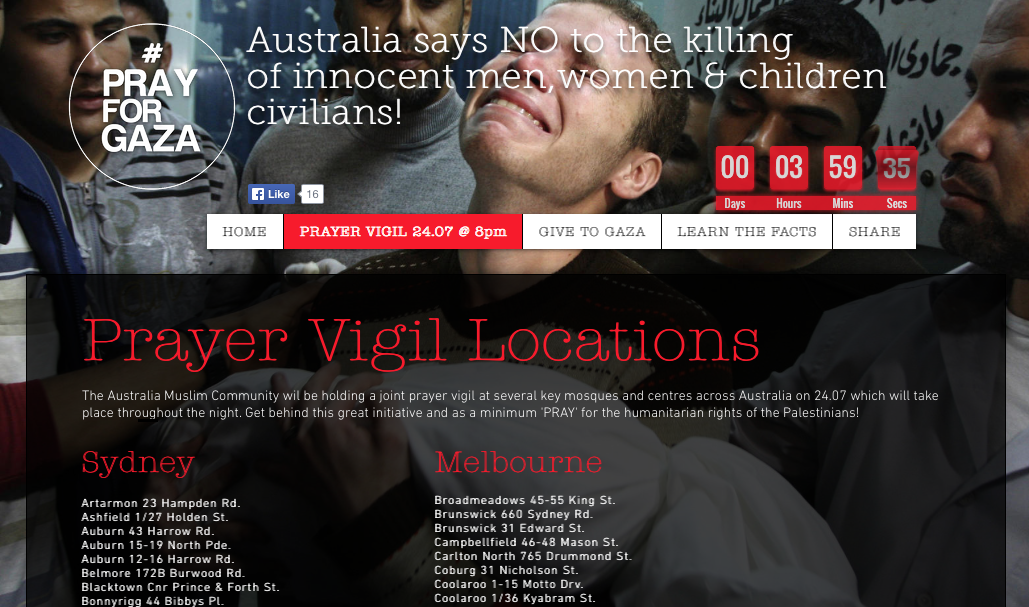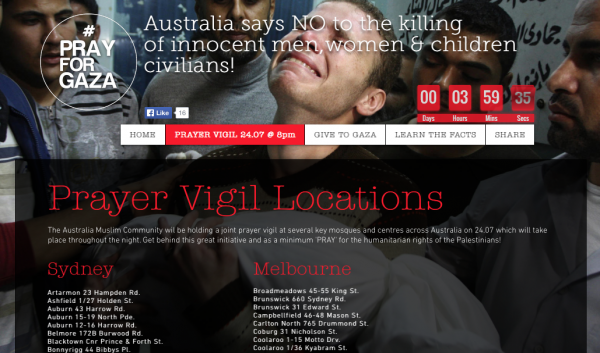
MEDIA RELEASE
24 July 2014
Australian Muslims stand in solidarity with Palestinians
Australia’s Muslim community is outraged at Israel’s mass murder of civilians in Gaza.
United in their grief and concern for the escalating conflict in Gaza, Muslim communities across Australia will hold a Prayer Vigil at 8pm tonight as they gather at mosques. It is expected that approximately 150,000 people across the country will join the Prayer Vigil.
The community is deeply disturbed by the Australian government’s silence. Sixteen days on and the international community, including Australia, remains largely silent as the Israeli army continues its deadly assault on Gaza. Over 650 innocent women, children and men have been killed in just 16 days. Entire families have been wiped out, hospitals bombed, and homes and suburbs destroyed. Indeed, the United Nations High Commissioner for Human Rights yesterday expressed the view that Israel may be guilty of war crimes.
Australia’s Muslim community condemns in the strongest possible terms the gross and disproportionate military assault by Israel– a military juggernaut and covert nuclear state– against the Palestinian people it occupies, besieges and controls. More than 1.5 million Palestinians are crammed into 140 square miles, the most densely populated area in the world. Israel controls Gaza’s airspace, waters and borders and has imposed a crippling blockade over Gaza.
The community repudiates Israel’s claims to be acting in self defence. “It is sinister propaganda to suggest that Israel is acting in self-defence when it is raining down tonnes of bombs on a besieged, impoverished, defenceless population who, because of Israel’s blockade, are unable to even escape or flee,” says Randa Abdel-Fattah of PrayforGaza.
Australia’s Muslim Community calls upon;
• the Australian government to use its position at the UN Security Council to condemn Israel’s aggression and call upon Israel to put an end to their offensive, to acknowledge the oppression that the Palestinians endure, and to call for the blockade of Gaza to be lifted so that aid supplies can reach the Palestinian people;
• the wider Australian community to lobby local government to take a position against Israel’s crimes against humanity and join the growing body of individuals and institutions who support the global Boycott Divestment Sanctions (BDS) movement;
• the international community to condemn the actions of Israel, call for an end to the airstrikes and incursions and prevent any further military action from taking place;
• the United Nations to call out the human rights violations being committed against the Palestinians and implement sanctions against Israel;
• media outlets to provide fair and objective reporting, to cease distorting coverage of Israel’s atrocities and to give Palestinians the dignity of having their plight reported truthfully.
Australia’s Muslim Community urges the Australian government to stop being on the wrong side of history and to join the overwhelming majority of the world in recognizing all Palestinian Territories as occupied and all Israeli settlements as illegal.
For more details visit www.prayforgaza.com.au
Statement on behalf of:
Office of The Mufti of Australia
Australian National Imams Council (ANIC) Australian Islamic Centre
Islamic Council of New South Wales (ICNSW) Islamic Council of Victoria
Lebanese Muslim Association (LMA)
Muslim Students Association of Australia
Mosque Media Contacts
Sydney – Lakemba Mosque – Ahmed Malas 0410 414 205
Brisbane – Kuraby Mosque – Ali Khadri 0430 029 718
Melbourne – ICV Mosque – Nail Aykan 0430 545 800
Perth – Masjid Ibrahim – Burhan Mehtar 0452 217 866
For further enquiries, please contact:
PrayForGaza – Randa Abdel-Fattah 0411 135 654
ANIC – Hassan Elsetohy 0402 020 397
RELATED:
Read this dua for Gaza: Hizb al-Nasr
By: http://www.nursacredsciences.com
Source: http://www.nursacredsciences.com
MV Editor’s Note: Given the crisis in Gaza brought on by wanton Israeli aggression we encourage readers to read Imam Abū al-Ḥasan al-Shādhilī’s Hizb al-Nasr by way of praying for victory for our oppressed brothers and sisters in Gaza and Palestine and elsewhere where the children of the Umma suffer.
The Hizb al-Naṣr, or Litany of Victory, was composed approximately 800 years ago by the great Shaykh Abū al-Ḥasan al-Shādhilī (592/1196-655/1258). It was often referred to as the “sword of Shādhilī,” due to its potency and his use of this prayer when he and his students fought the Crusaders in 1250. Shaykh al-Shādhilī’s eyesight had become weakened during this period and when he was later asked about his ability to perform so bravely on the battle field despite his limited ability to see he replied, “When the eye of the heart sees with clarity there is no need for other eyes.” We are reminded here that while taking the material means for success in this world is important, the true cause of success comes from the unseen. It is ultimately God who grants victory to the men and women with hearts that are turned to Him in remembrance.
Below is a “sword” with which enemies have been defeated since the time of Shaykh al-Shādhilī onwards. The Prophet, may peace and blessings be upon him, taught us that the Muslims are like one body. If any part of the body ails, the entire body feels its pain. Truly, concern for the any part of the Muslim community is a reflection of the depth of one’s faith and praying for the oppressed is the simplest obligation we have towards one another. Let us remember the oppressed and suffering throughout the world and help them through praying for them daily.
Click here to download a PDF of the Hizb.
Below is the Arabic Text followed by the transliteration in English.
Hizb al-Nasr (Arabic and English Transliteration)
ARABIC:
حِـزْبُ النـَّصْـرِ المـُبـَارَكِ
لِسـَيـِّدي أبـِي الحـَسـَنِ الشـَّاذلـِي
بـِـسْـمِ اللهِ الرَّحمـنِ الرَّحـيمِ
اللهـُمَّ بـِسَطـْوَةِ جَبـَروتِ قـَهـْرِكَ وبـِسُرْعـَةِ إغـَاثـَةِ نـَصـْرِكَ وَبـِغِـيرَتـِكَ لإنـْـتـِهـَاكِ حُرُمَـاتِكَ وَبـِحـِمَايَتِكَ لِـمَن إحـْـتـَمـَى بـِآياتِكَ أسألـُكَ يا اللهُ يَا سَميعُ يَا قـَريبُ يَا مُجـِيبُ يَا سَريعُ يَا مُنـْتـَـقِمُ يَا شـَديدَ البَـطـْشِ يَا جَبََّارُ يَا قـَهـَّارُ يَا مَنْ لا يُعْـجـِزُهُ قـَهـْرُ الجَبـَابـِرَةِ ولا يَعْظـُمُ عـَلـَيْهِ هَلاكُ المُتـَمَرِّدَةِ مِنَ المُلوكِ والأكـَاسِرَةِ أن تـَجْـعَلَ كـَيـْدَ مَنْ كـَادَنِي في نـَحْرِهِ وَمَكـْرَ مَنْ مَكـَرَ بي عَـائِداً عَليهِ وَحُـفـْرَة مَنْ حَفـَرَ لي وَاقِعاً فيها وَمَنْ نـَصَبَ لي شـَبـَكـَة الخَدَاعِ إجْعَلـْهُ يا سَيِّدي مُسَاقاً إليها وَمُصَـاداً فيها وَأسِيراً لـَدَيْهـَا اللهُمَّ بـِحَقِّ كـهيعص إكـْـفِـنـَا هَمَّ العِدا وَلـَقـِّهـِمْ الرَّدَى وَإجْعـَلهُمْ لِكـُلِّ حَبيبٍ فِداً وَسَلـِّط عَلـَيـْهـِمْ عَاجـِلَ النـِّقـْمـَةِ في اليَوْمِ والغـَدِ. اللهُمَّ بَدِّدْ شـَمْلـَهـُمْ، اللهُمَّ فـَرِّق جَمْـعَـهـُم اللهُمَّ أقـْلِلْ عَدَدَهـُمْ، اللهُمَّ فـُلَّ حَدَّهُمْ، اللهُمَّ إجْعَلْ الدَّائِرَة عَلـَيـْهـِمْ اللهُمَّ أرْسِلْ العَذابَ إليهـِمْ، اللهُمَّ أخـْرِجْـهـُمْ عَنْ دَائِرَةِ الحِلـْمِ وَإسْـلـُبـْهـُمْ مَدَدَ الإمْـهـَالِ وغـُلَّ أيْديَهـُمْ وإرْبـِط عَلـَى قـُلوبـِهـِمْ ولا تـُبـَلـِّغـْهـُمْ الآمال، اللهُمَّ مَزِّقـْهـُمْ كـُلَّ مُمَزَّقٍ مَزَّقـْـتـَهُ لأعْدَائِكَ إنـْـتِصـَاراً لأنـْبـِيائِكَ وَرُسُـلِكَ وَأولِيائِـكَ اللهُمَّ إنـْـتـَصِرْ لنا إنـْـتـِصَـارَكَ لأحْبـَابـِكَ على أعْدَائِكَ، اللهُمَّ لا تـُمَكـِّنْ الأعْداءَ فينا ولا تـُسـَلـِطـَهـُمْ عَـلـَيْـنـَا بـِذنوبـِنـَا حم حم حم حـــم حم حم حم حُـمَّ الأمْرُ وَجَاءَ النـَصـْرُ فـَعـَلينـْا لا يـُنـْصـَرون حمعسق حِمَايَتـُنـَا مِمَّا نـَخـَافُ، اللهُمَّ قـِنـَا شـَرَّ الأسْواءِ ولا تـَجْعـَلنـَا مَحـَلاً للبـَلـْواءِ، اللهُمَّ أعْطِنـَا أمَلَ الرَّجَاءِ وَفـَوْقَ الأمَلِ يَا هُوَ يَا هُوَ يَا هُوَ يَا مَنْ بـِفـَضْـلِهِ لِفـَضْلِهِ نـَسْألْ – نـَسْألـُكَ العَجـَلَ العَجَلَ إلهي الإجَابَة الإجَابَة يَا مَنْ أجَابَ نـُوحاً في قـَوْمِهِ يَا مَنْ نـَصَرَ إبْراهِيمَ عَلى أعْدائِهِ يَا مَنْ رَدَّ يُوسُفَ على يَعْـقوب يَا مَنْ كـَشـَفَ ضـُرَّ أيُّوبَ يَا مَنْ أجَابَ دَعْوَةَ زكـَرِيَّا يَا مَنْ قـَبـِلَ تـَسـْبيحَ يُونـُسَ بـِنْ مَتـَّى نـَسْـألـُكَ بـِأسْرارِ أصْحـَابِ هَذِهِ الدَّعَوَاتِ أنْ تـَقـْبـَلَ مَا بـِهِ دَعَوْنـَاكَ وأنْ تـُعْطِينـَا مَا سَألناكَ أنـْجـِزْ لنـَا وَعْدَكَ الذي وَعَدْتـَهُ لِعِـبَادِكَ المُؤمِنين لا إلهَ الا أنـْتَ سُبْحَانـَكَ إني كـُنـْتُ مِنَ الظـَّالِمِينَ إنـْـقـَطـَعـَتْ آمَالـُنـَا وَعِزَّتِكَ الا مِنـْكَ وَخـَابَ رَجَاؤُنـَا وَحَـقِـكَ الا فيكَ.
إنْ أبْطـَأتْ غـَارَةُ الأرْحَامِ وإبْـتـَعـَدَتْ فـَأقـْرَبُ السَّيْرِ مِنـَّا غـَارَةُ اللهِ
يا غـَارَةَ اللهِ جـِدِي السـَّيـْرَ مُسْرِعَة في حَلِّ عُـقـْدَتـِنـَا يَا غـَارَةَ اللهِ
عَدَتْ العَادونَ وَجَارُوا وَرَجَوْنـَا اللهَ مُجـيراً
وَكـَفـَى باللهِ وَلـِيـَّا وَكـَفـَى باللهِ نـَصِيراً
(حَسْبـُنـَا اللهُ وَنِعْمَ الوَكِيلُ – ثلاثا) (ولا حَوْلَ ولا قـُوَةَ الا باللهِ العَليِّ العَظِيمِ إسْـتـَجـِبْ لـَنـَا آمين – ثلاثا) فـَقـُطِعَ دَابـِرُ القـَوْمِ الذينَ ظـَلـَمُوا والحَمْدُ لِلهِ رَبَّ العَالـَمينَ ولا حَوْلَ ولا قـُوَّةَ الا باللهِ العَلِيّ العَظِيمِ وَصَـلـَّى اللهُ عَـلـَى سَيـِّدِنـَا مُحَمَّدٍ النـَّبـِيّ الأمِيِّ وَعَلى آلِهِ وَصَحْبـِهِ وَسَـلـَّمَ.
إنتهى حِزْبُ النـَّصـْرِ المُبـَارَكِ
ENGLISH TRANSLITERATION
Allāhumma bi ṣaṭwati jabarūti qahrik, wa bi-surʽati ighāthati naṣrik, wa bi ghīratika
bi-intihāki ḥurumātik, wa bi-ḥimāyatika liman iḥtam ā bi-āyātik, nasʽaluka yā Allāh, yā
samīʽ, yā qarīb, yā mujīb, yā sarīʽ, yā muntaqim, y ā shadīd al-baṭsh, yā jabbār, yā qahhār, yā
man lā yuʽjizuhu qahru-l jabābira, wa lā yaʽẓumu ʽa layhi halāku al-mutamarridati min al-
mulūk al-akāsira, an tajʽal kayda man kādanā fī naḥ rih, wa makra man makara binā ʽāʼidan
ʽalayh, wa ḥufrata man ḥafara lanā wāqiʽan fīhā, wa man naṣaba lanā shabakat al-khidāʽ
ijʽalhu yā sayyidī musāqan ilayhā, wa muṣādan fīhā, wa asīran ladayhā.
Allāhumma bi-ḥaqqi kāf-hā-yā-ʽayn-ṣād ikfinā hamma al-ʽidā, wa laqqihimu al-radā,
wajʽalhum li-kulli ḥabībin fidā,wa ṣalliṭ ʽalayhim ʽājil al-naqmati fī al-yawmi wa al-ghadā.
Allāhumma baddid shamlahum. Allāhumma farriq jamʽa hum. Allāhumma aqlil
ʽadadahum. Allāhumma filla ḥaddahum. Allāhumma aj ʽal al-dāʼirata ʽalayhim.
Allāhumma arsil al-ʽadhāba ilayhim. Allāhumma akhr ijhum ʽan dāʼirati al-ḥilm,
waslubhum madada al-imhāl. Wa ghulla aydīhim wa ar julahum. Warbuṭ ʽalā qulūbihim.
Wa lā tuballighhum al-āmāl. Allāhumma mazziqhum ku lla mumazzaqin mazzaqtahu li-
aʽdāʼika intiṣāran li-anbiyāʼika, wa rusulika, wa a wliyāʼik. Allāhumma antaṣir lanā
intiṣāraka li-aḥbābika ʽalā aʽdāʼik. Allāhumma lā tumakkin al-aʽdāʼa fīnā. Wa lā
tuṣalliṭhum ʽalaynā bi dhunūbinā. Ḥā-mīm, ḥā-mīm, ḥā-mīm, ḥā-mīm, ḥā-mīm! Ḥumma
al-amru wa jāʼa al-naṣru fa-ʽalaynā lā yunṣarūn. Ḥ ā-mīm, ʽayn-sīn-qāf! Ḥimāyatunā
mimmā nakhāf. Allāhumma qinā shar al-aswāʼ, wa lā tajʽalnā maḥallan lil-balwā.
Allāhumma aʽṭinā amal al-rajāʼi wa fawq al-amal. Y ā-Hū, Yā-Hū, Yā-Hū! Yā man bi-
faḍlihi li-faḍlihi nasʼal! Nasʽaluka al-ʽajal, al- ʽajal! Ilāhī al-ijāba! Al-Ijābata Yā man ajāba
nūḥan fī qawmih! Yā man naṣara Ibrāhīma ʽalā aʽdāʼ ih! Yā man radda Yūsufa ʽalā Yaʽqūb!
Yā man kashafa ḍurra Ayyūb! Yā man ajāba daʽwata Z akariyyā! Ya man qabila tasbīḥa
Yūnus abna Mattā! Nasʽaluka Allāhumma bi-asrāri aṣ ḥābi hādhihi al-daʽwāt an tataqabbala mā bihi daʽawnāk, wa an tuʽṭīnā mā saʽalnāk, wa anj iz lanā waʽdaka alladhī waʽadtahu li-
ʽibādika al-muʼminīn. “Lā ilāhā illā anta subḥānak a innī kuntu min al-ẓālimīn!” Inqaṭaʽat
āmālunā wa ʽizzatika illā mink, wa khāba rajāʼunā w a ḥaqqika illā fīk!
In abṭaʼat ghārat al-arḥāmi wa abtaʽadat.
Fa-aqrabu shayʼi minnā ghāratullāh
Yā ghāratallāhi jiddī sayra musriʽatan
Fī ḥallī ʽuqdatinā yā ghāratallāh
ʽ A d a t a l-ʽ ā d ū n a w a j ā r ū
W a r a j a w n ā A ll ā h a m u jī r ā
W a k a f ā b ill ā h i w a li y y ā
W a k a f ā b ill ā h i n a ṣ ī r ā
Wa ḥasbuna Allāhu wa niʽma al-wakīl. Wa lā ḥawla w a lā quwwata illā billāhi al-
ʽaliyyi al-ʽaẓīm. Istajib lanā, amīn! Fa-quṭiʽa d ābiru al-qawmi allādhīna ẓalamū wa al-
ḥamdu lillāhi rabbi al-ʽālamīn. Wa ṣallā Allāhu ʽa lā sayyidinā Muḥammad al-nabiyy al-
ummī wa ʽalā ālihi wa ṣaḥbihi wa sallam taslīmā.



